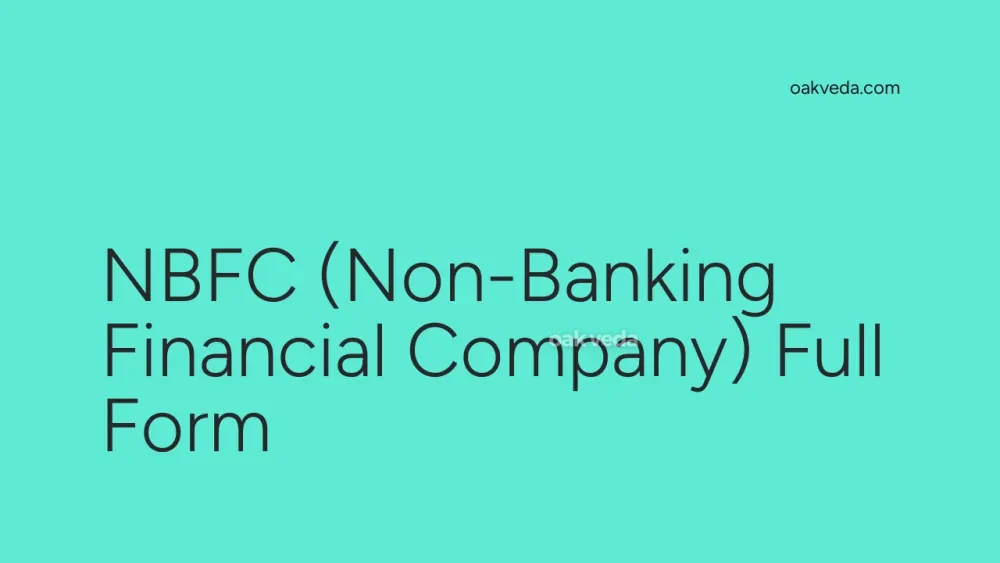
What is the Full Form of NBFC?
The full form of NBFC is Non-Banking Financial Company. This term refers to a specific type of financial institution that plays a crucial role in the modern financial ecosystem.
What is a Non-Banking Financial Company?
A Non-Banking Financial Company (NBFC) is a financial institution that provides various banking services without meeting the legal definition of a bank. These companies are registered under the Companies Act and regulated by the Reserve Bank of India (RBI) under the RBI Act, 1934. NBFCs offer a wide range of financial services, including loans, credit facilities, retirement planning, and investing.
Origin and Development of Non-Banking Financial Companies
The concept of NBFCs emerged as a response to the growing need for alternative financial services outside the traditional banking sector. In India, NBFCs have been operating for decades, but their significance has grown substantially since the 1990s due to financial liberalization and increased demand for diverse financial products.
How do Non-Banking Financial Companies work?
NBFCs operate by raising funds through various means, such as issuing stocks, bonds, and debentures. They use these funds to provide loans and invest in securities. Unlike banks, NBFCs cannot accept demand deposits or issue checks. Their primary focus is on providing specialized financial services to niche segments of the market.
Types of Non-Banking Financial Companies
There are several types of NBFCs, each catering to specific financial needs:
- Asset Finance Companies
- Investment Companies
- Loan Companies
- Infrastructure Finance Companies
- Microfinance Institutions
- Housing Finance Companies
Functions of Non-Banking Financial Companies
NBFCs perform various essential functions in the financial sector:
- Providing loans and advances
- Offering leasing and hire-purchase services
- Facilitating bill discounting
- Managing investment portfolios
- Underwriting stocks and shares
- Providing venture capital
Applications of Non-Banking Financial Companies
NBFCs find applications in numerous areas of finance:
- Small Business Financing: Offering loans to SMEs and startups
- Consumer Durables Financing: Providing easy payment options for electronics and appliances
- Vehicle Financing: Facilitating auto loans for personal and commercial vehicles
- Gold Loans: Offering loans against gold as collateral
- Real Estate Financing: Providing loans for property purchase and development
Features of Non-Banking Financial Companies
Key features that distinguish NBFCs include:
- Flexibility: Able to cater to specific customer needs
- Niche Focus: Specializing in particular sectors or financial products
- Innovation: Often introducing new financial products and services
- Less Stringent Regulations: Compared to traditional banks
- Higher Risk, Higher Returns: Generally offering higher interest rates on deposits
Benefits of Non-Banking Financial Companies
NBFCs offer several advantages to the financial ecosystem:
- Financial Inclusion: Reaching underserved segments of the population
- Customized Products: Offering tailored financial solutions
- Quick Service: Often providing faster loan approvals than traditional banks
- Complementing Banks: Filling gaps in banking services
- Economic Growth: Contributing to overall economic development by supporting various sectors
Limitations or Challenges of Non-Banking Financial Companies
Despite their benefits, NBFCs face certain challenges:
- Higher Interest Rates: Often charging higher rates than banks
- Limited Deposit Insurance: Deposits in NBFCs are not insured by the Deposit Insurance and Credit Guarantee Corporation
- Regulatory Scrutiny: Increasing oversight from regulators to ensure stability
- Asset-Liability Mismatch: Potential risk due to difference in maturity profiles of assets and liabilities
- Competition: Facing competition from banks and fintech companies
Future Developments in Non-Banking Financial Company Technology
The future of NBFCs is closely tied to technological advancements:
- Digital Transformation: Adopting digital platforms for customer acquisition and service delivery
- AI and Machine Learning: Implementing advanced analytics for credit scoring and risk assessment
- Blockchain: Exploring blockchain technology for secure and transparent transactions
- Partnerships with Fintech: Collaborating with fintech companies to enhance service offerings
- Data-Driven Decision Making: Utilizing big data for more accurate financial decisions
FAQs on NBFC Full Form
-
What is the main difference between a bank and an NBFC? The primary difference is that banks can accept demand deposits and issue checks, while NBFCs cannot.
-
Are NBFCs regulated in India? Yes, NBFCs are regulated by the Reserve Bank of India under the RBI Act, 1934.
-
Can NBFCs accept deposits from the public? Some NBFCs are allowed to accept deposits, but they are subject to RBI regulations.
-
What is the minimum net owned fund required for an NBFC? As per current RBI guidelines, the minimum net owned fund required is ₹2 crore.
-
Are NBFC deposits insured? No, NBFC deposits are not insured by the Deposit Insurance and Credit Guarantee Corporation.
In conclusion, Non-Banking Financial Companies play a vital role in the financial sector by providing specialized services and reaching underserved segments. As they continue to evolve with technological advancements, NBFCs are poised to remain an integral part of the financial ecosystem, complementing traditional banking services and fostering financial inclusion.
You may be interested in:
- SGPT (Serum Glutamic Pyruvic Transaminase)
- CMA (Credit Monitoring Arrangement) Full Form
- IPCC (Full Form): Intergovernmental Panel on Climate Change
- IOB (Indian Overseas Bank): Full Form and Overview
- ABS (Anti-lock Braking System): Full Form and Function
- XML (Extensible Markup Language): Full Form and Guide

